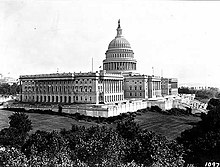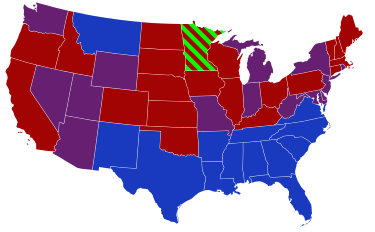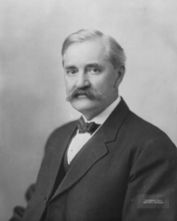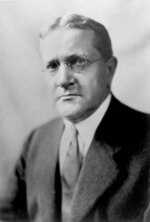69th United States Congress
| 69th United States Congress | |
|---|---|
68th ← → 70th | |
 United States Capitol (1906) | |
March 4, 1925 – March 4, 1927 | |
| Members | 96 senators 435 representatives 5 non-voting delegates |
| Senate Majority | Republican |
| Senate President | Charles G. Dawes (R) |
| House Majority | Republican |
| House Speaker | Nicholas Longworth (R) |
| Sessions | |
| Special: March 4, 1925 – March 18, 1925 1st: December 7, 1925 – July 3, 1926 2nd: December 6, 1926 – March 3, 1927 | |
The 69th United States Congress was a meeting of the legislative branch of the United States federal government, consisting of the United States Senate and the United States House of Representatives. It met in Washington, D.C. from March 4, 1925, to March 4, 1927, during the third and fourth years of Calvin Coolidge's presidency. The apportionment of seats in the House of Representatives was based on the Thirteenth Decennial Census of the United States in 1910.
The Republicans made modest gains in maintaining their majority in both chambers, and with the election of President Calvin Coolidge to his own term in office, the Republicans maintained an overall federal government trifecta.[1]
Major events[]
A special session of the Senate was called by President Coolidge on February 14, 1925.
- Impeachment of Judge George W. English — On April 1, 1926, the House of Representatives impeached Judge George W. English of the United States District Court for the Eastern District of Illinois. Both Houses adjourned on July 3, 1926, with the Senate scheduled to reconvene on November 10, 1926, as a Court of Impeachment. English resigned before the impeachment trial began. The Senate met as planned on November 10, 1926, to adjourn the court of impeachment sine die. On December 13, 1926, the Senate, acting on advice from the House managers of the impeachment, formally dismissed all charges against Judge English.
- January 17, 1927: U.S. Supreme Court held (McGrain v. Daugherty) that Congress has the power to compel witness and testimony.
Major legislation[]

- February 26, 1926: Revenue Act of 1926
- April 12, 1926:
- May 8, 1926:
- May 20, 1926: Air Commerce Act
- May 20, 1926:
- May 20, 1926: Railway Labor Act (Parker-Watson Act)
- May 25, 1926:
- May 25, 1926: Public Buildings Act of 1926 (Elliot-Fernald Act)
- May 26, 1926: Shenandoah National Park Act of 1926
- June 3, 1926:
- June 14, 1926:
- June 15, 1926:
- July 2, 1926: Cooperative Marketing Act
- July 3, 1926: Walsh Act
- July 3, 1926: Passport Act of 1926
- January 21, 1927:
- February 23, 1927: Radio Act of 1927 (Dill-White Act)
- February 25, 1927: McFadden Act (Pepper-McFadden Act)
- March 3, 1927:
- March 3, 1927:
- March 4, 1927: Mayfield-Newton Act
Party summary[]

The count below identifies party affiliations at the beginning of the first session of this Congress, and includes members from vacancies and newly admitted states, when they were first seated. Changes resulting from subsequent replacements are shown below in the "Changes in membership" section.
Senate[]
| Party (shading shows control) |
Total | Vacant | |||
|---|---|---|---|---|---|
| Democratic (D) |
Farmer– Labor (FL) | Republican (R) |
|||
| End of previous congress | 42 | 2 | 52 | 96 | 0 |
| Begin | 40 | 1 | 55 | 96 | 0 |
| End | 42 | 52 | 95 | 1 | |
| Final voting share | 44.2% | 1.1% | 54.7% | ||
| Beginning of next congress | 47 | 1 | 46 | 94 | 2 |
House of Representatives[]
| Party (shading shows control) |
Total | Vacant | ||||
|---|---|---|---|---|---|---|
| Democratic (D) |
Farmer– Labor (FL) | Socialist (Soc.) | Republican (R) |
|||
| End of previous congress | 208 | 2 | 1 | 222 | 433 | 2 |
| Begin | 183 | 3 | 1 | 247 | 434 | 1 |
| End | 182 | 433 | 2 | |||
| Final voting share | 42.0% | 0.7% | 0.2% | 57.0% | ||
| Beginning of next congress | 194 | 2 | 1 | 237 | 434 | 1 |
Leadership[]
Senate[]

Charles G. Dawes (R)

Albert B. Cummins (R), until March 6, 1925

George H. Moses (R), from March 6, 1925
- President: Charles G. Dawes (R)
- President pro tempore: Albert B. Cummins (R), elected March 4, 1925
- George H. Moses (R), elected March 6, 1925
Majority (Republican) leadership[]
- Majority Leader: Charles Curtis
- Majority Whip: Wesley L. Jones
- Republican Conference Secretary: James Wolcott Wadsworth Jr.
- National Senatorial Committee Chair: Lawrence C. Phipps
Minority (Democratic) leadership[]
- Minority Leader: Joseph T. Robinson
- Minority Whip: Peter G. Gerry
- Democratic Caucus Secretary: William H. King
House of Representatives[]

Nicholas Longworth (R)
- Speaker: Nicholas Longworth (R)
Majority (Republican) leadership[]
- Majority Leader: John Q. Tilson
- Majority Whip: Albert H. Vestal
- Republican Conference Chairman: Willis C. Hawley
- Republican Campaign Committee Chairman: William R. Wood
Minority (Democratic) leadership[]
- Minority Leader: Finis J. Garrett
- Minority Whip: William Allan Oldfield
- Democratic Caucus Chairman: Charles D. Carter
Members[]
This list is arranged by chamber, then by state. Senators are listed by class, and representatives by district.
Senate[]
Senators were elected every two years, with one-third beginning new six-year terms with each Congress. Preceding the names in the list below are Senate class numbers, which indicate the cycle of their election. In this Congress, Class 1 meant their term began in the last Congress, facing re-election in 1928; Class 2 meant their term began with this Congress, facing re-election in 1930; and Class 3 meant their term ended with this Congress, facing re-election in 1926.
Alabama[]
Arizona[]
Arkansas[]
California[]
Colorado[]
Connecticut[]
Delaware[]
Florida[]
Georgia[]
Idaho[]
Illinois[]
Indiana[]
Iowa[]
Kansas[]
Kentucky[]
Louisiana[]
Maine[]
Maryland[]
Massachusetts[]
Michigan[]
Minnesota[]
Mississippi[]
Missouri[]
|
Montana[]
Nebraska[]
Nevada[]
New Hampshire[]
New Jersey[]
New Mexico[]
New York[]
North Carolina[]
North Dakota[]
Ohio[]
Oklahoma[]
Oregon[]
Pennsylvania[]
Rhode Island[]
South Carolina[]
South Dakota[]
Tennessee[]
Texas[]
Utah[]
Vermont[]
Virginia[]
Washington[]
West Virginia[]
Wisconsin[]
Wyoming[]
|
 Senate Majority Leader Charles Curtis (R)  Senate Minority Leader Joseph Robinson (D)
|
House of Representatives[]
Alabama[]
Arizona[]
Arkansas[]
California[]
Colorado[]
Connecticut[]
Delaware[]
Florida[]Georgia[]
Idaho[]Illinois[]
Indiana[]
Iowa[]
Kansas[]
Kentucky[]
Louisiana[]
Maine[]Maryland[]
Massachusetts[]
Michigan[]
Minnesota[]
Mississippi[]
Missouri[]
Montana[] |
Nebraska[]
Nevada[]
New Hampshire[]New Jersey[]
New Mexico[]
New York[]
North Carolina[]
North Dakota[]Ohio[]
Oklahoma[]
Oregon[]Pennsylvania[]
Rhode Island[]
South Carolina[]
South Dakota[]Tennessee[]
Texas[]
Utah[]Vermont[]Virginia[]
Washington[]
West Virginia[]
Wisconsin[]
Wyoming[]
Non-voting members[]
|

 House Majority Leader John Tilson (R)
| ||||||||
Changes in membership[]
The count below reflects changes from the beginning of the first session of this Congress.
Senate[]
- Replacements: 10
- Democratic: 2 net gain
- Republican: 3 net loss
- Deaths: 7
- Resignations: 0
- Contested election: 1
- Interim appointments: 2
- Total seats with changes: 9
| State | Senator | Reason for vacancy | Successor | Date of successor's installation |
|---|---|---|---|---|
| Missouri (3) |
Selden P. Spencer (R) | Died May 16, 1925. Successor was appointed. | George H. Williams (R) | May 25, 1925 |
| Wisconsin (1) |
Robert M. La Follette (R) | Died June 18, 1925. Successor was elected. | Robert M. La Follette Jr. (R) | September 30, 1925 |
| North Dakota (3) |
Edwin F. Ladd (R) | Died June 22, 1925. Successor was appointed and subsequently elected | Gerald Nye (R) | November 14, 1925 |
| Indiana (1) |
Samuel M. Ralston (D) | Died October 14, 1925. Successor was appointed and subsequently elected. | Arthur R. Robinson (R) | October 20, 1925 |
| Iowa (2) |
Smith W. Brookhart (R) | Lost election challenge April 12, 1926 | Daniel F. Steck (D) | April 12, 1926 |
| Iowa (3) |
Albert B. Cummins (R) | Died July 30, 1926. Successor was appointed and subsequently elected. |
David W. Stewart (R) | August 7, 1926 |
| Maine (2) |
Bert M. Fernald (R) | Died August 23, 1926. Successor was elected. | Arthur R. Gould (R) | November 30, 1926 |
| Massachusetts (1) |
William M. Butler (R) | Appointed in previous Congress and served until successor was elected. | David I. Walsh (D) | December 6, 1926 |
| Missouri (3) |
George H. Williams (R) | Successor was elected. | Harry B. Hawes (D) | December 6, 1926 |
| Illinois (3) |
William B. McKinley (R) | Died December 7, 1926. Frank L. Smith was appointed by the governor some date in December 1926[3] but the US Senate voted to not allow him to qualify as a senator, based upon fraud and corruption in his campaign. | Vacant | |
House of Representatives[]
- Replacements: 9
- Democratic: 1 seat net loss
- Republican: 1 seat net gain
- Deaths: 9
- Resignations: 2
- Total seats with changes: 12
| District | Vacated by | Reason for vacancy | Successor | Date of successor's installation |
|---|---|---|---|---|
| New Jersey 3rd | Vacant | Rep. T. Frank Appleby died during previous congress | Stewart H. Appleby (R) | November 3, 1925 |
| Massachusetts 5th | John J. Rogers (R) | Died March 28, 1925 | Edith Nourse Rogers (R) | June 30, 1925 |
| Michigan 3rd | Arthur B. Williams (R) | Died May 1, 1925 | Joseph L. Hooper (R) | August 18, 1925 |
| Massachusetts 2nd | George B. Churchill (R) | Died July 1, 1925 | Henry L. Bowles (R) | September 29, 1925 |
| Kentucky 3rd | Robert Y. Thomas Jr. (D) | Died September 3, 1925 | John W. Moore (D) | December 26, 1925 |
| California 2nd | John E. Raker (D) | Died January 22, 1926 | Harry L. Englebright (R) | August 31, 1926 |
| Massachusetts 8th | Harry I. Thayer (R) | Died March 10, 1926 | Frederick W. Dallinger (R) | November 2, 1926 |
| California 5th | Lawrence J. Flaherty (R) | Died June 13, 1926 | Richard J. Welch (R) | August 31, 1926 |
| Illinois 12th | Charles E. Fuller (R) | Died June 25, 1926 | Seat remained vacant until next Congress | |
| Kentucky 10th | John W. Langley (R) | Resigned January 11, 1926, after being convicted of illegally selling alcohol | Andrew J. Kirk (R) | February 13, 1926 |
| Missouri 11th | Harry B. Hawes (D) | Resigned October 15, 1926 | John J. Cochran (D) | November 2, 1926 |
| Ohio 2nd | Ambrose E. B. Stephens (R) | Died February 12, 1927 | Seat remained vacant until next Congress | |
Committees[]
Lists of committees and their party leaders, for members (House and Senate) of the committees and their assignments, go into the Official Congressional Directory at the bottom of the article and click on the link (4 links), in the directory after the pages of terms of service, you will see the committees of the Senate, House (Standing with Subcommittees, Select and Special) and Joint and after the committee pages, you will see the House/Senate committee assignments in the directory, on the committees section of the House and Senate in the Official Congressional Directory, the committee's members on the first row on the left side shows the chairman of the committee and on the right side shows the ranking member of the committee.
Senate[]
- Agriculture and Forestry (Chairman: George W. Norris; Ranking Member: Ellison D. Smith)
- (Select)
- Appropriations (Chairman: Francis E. Warren; Ranking Member: Lee S. Overman)
- Audit and Control the Contingent Expenses of the Senate (Chairman: Henry W. Keyes; Ranking Member: Kenneth McKellar)
- Banking and Currency (Chairman: George P. McLean; Ranking Member: Duncan U. Fletcher)
- Civil Service (Chairman: James Couzens then Porter H. Dale; Ranking Member: Kenneth McKellar)
- Claims (Chairman: Rice W. Means; Ranking Member: Park Trammell)
- Commerce (Chairman: Wesley L. Jones; Ranking Member: Duncan U. Fletcher)
- District of Columbia (Chairman: Arthur Capper; Ranking Member: William H. King)
- Education and Labor (Chairman: Lawrence C. Phipps; Ranking Member: Andrieus A. Jones)
- Enrolled Bills (Chairman: Frank L. Greene; Ranking Member: Coleman L. Blease)
- Expenditures in Executive Departments (Chairman: David A. Reed; Ranking Member: Oscar W. Underwood)
- Finance (Chairman: Reed Smoot; Ranking Member: Furnifold M. Simmons)
- Foreign Relations (Chairman: William E. Borah; Ranking Member: Claude Swanson)
- Immigration (Chairman: Hiram W. Johnson; Ranking Member: William H. King)
- Indian Affairs (Chairman: John W. Harreld; Ranking Member: Henry F. Ashurst)
- (Select)
- Interoceanic Canals (Chairman: Walter Evans Edge; Ranking Member: Thomas J. Walsh)
- Interstate Commerce (Chairman: James Eli Watson; Ranking Member: Ellison D. Smith)
- Irrigation and Reclamation (Chairman: Charles L. McNary; Ranking Member: Morris Sheppard)
- Judiciary (Chairman: Albert B. Cummins; Ranking Member: Lee S. Overman)
- Library (Chairman: Simeon D. Fess; Ranking Member: Kenneth McKellar)
- Manufactures (Chairman: William B. McKinley; Ranking Member: Ellison D. Smith)
- Military Affairs (Chairman: James W. Wadsworth Jr.; Ranking Member: Duncan U. Fletcher)
- Mines and Mining (Chairman: Tasker L. Oddie; Ranking Member: Thomas J. Walsh)
- Naval Affairs (Chairman: Frederick Hale; Ranking Member: Claude A. Swanson)
- Patents (Chairman: William M. Butler; Ranking Member: Ellison D. Smith)
- Pensions (Chairman: Peter Norbeck; Ranking Member: Peter G. Gerry)
- Post Office and Post Roads (Chairman: George H. Moses; Ranking Member: Kenneth McKellar)
- Printing (Chairman: George W. Pepper; Ranking Member: Duncan U. Fletcher)
- Privileges and Elections (Chairman: Richard P. Ernst; Ranking Member: William H. King)
- Public Buildings and Grounds (Chairman: Bert M. Fernald; Ranking Member: James A. Reed)
- Public Lands and Surveys (Chairman: Robert Nelson Stanfield; Ranking Member: Key Pittman)
- Rules (Chairman: Charles Curtis; Ranking Member: Lee S. Overman)
- (Select)
- (Select)
- Territories and Insular Possessions (Chairman: Frank B. Willis; Ranking Member: Key Pittman)
- (Select)
- Whole
House of Representatives[]
- Accounts (Chairman: Clarence MacGregor; Ranking Member: Ralph Waldo Emerson Gilbert)
- Agriculture (Chairman: Gilbert N. Haugen; Ranking Member: James B. Aswell)
- Alcoholic Liquor Traffic (Chairman: Grant M. Hudson; Ranking Member: William D. Upshaw)
- Appropriations (Chairman: Martin B. Madden; Ranking Member: Joseph W. Byrns)
- Banking and Currency (Chairman: Louis T. McFadden; Ranking Member: Otis Wingo)
- Census (Chairman: E. Hart Fenn; Ranking Member: John E. Rankin)
- Civil Service (Chairman: Frederick R. Lehlbach; Ranking Member: Lamar Jeffers)
- Claims (Chairman: Charles L. Underhill; Ranking Member: John C. Box)
- Coinage, Weights and Measures (Chairman: Randolph Perkins; Ranking Member: Bill G. Lowrey)
- Disposition of Executive Papers (Chairman: Edward H. Wason; Ranking Member: Arthur B. Rouse)
- District of Columbia (Chairman: Frederick N. Zihlman; Ranking Member: Christopher D. Sullivan)
- Education (Chairman: Daniel A. Reed; Ranking Member: Bill G. Lowrey)
- Election of the President, Vice President and Representatives in Congress (Chairman: Hays B. White; Ranking Member: Lamar Jeffers)
- Elections No.#1 (Chairman: Don B. Colton; Ranking Member: C.B. Hudspeth)
- Elections No.#2 (Chairman: Bird J. Vincent; Ranking Member: Gordon Browning)
- Elections No.#3 (Chairman: Charles L. Gifford; Ranking Member: Guinn Williams)
- Enrolled Bills (Chairman: Guy E. Campbell; Ranking Member: Thomas L. Blanton)
- Expenditures in the Agriculture Department (Chairman: Edward J. King; Ranking Member: Frank Gardner)
- Expenditures in the Commerce Department (Chairman: Henry R. Rathbone; Ranking Member: Miles C. Allgood)
- Expenditures in the Interior Department (Chairman: William Williamson; Ranking Member: Sol Bloom)
- Expenditures in the Justice Department (Chairman: Willis G. Sears; Ranking Member: Frank Oliver)
- Expenditures in the Labor Department (Chairman: Carroll L. Beedy; Ranking Member: Thomas L. Blanton)
- Expenditures in the Navy Department (Chairman: George F. Brumm; Ranking Member: Charles L. Abernethy)
- Expenditures in the Post Office Department (Chairman: Philip D. Swing; Ranking Member: Guinn Williams)
- Expenditures in the State Department (Chairman: J. Will Taylor; Ranking Member: George C. Peery)
- Expenditures in the Treasury Department (Chairman: Ernest W. Gibson; Ranking Member: Heartsill Ragon)
- Expenditures in the War Department (Chairman: Thaddeus C. Sweet; Ranking Member: Arthur H. Greenwood)
- Expenditures on Public Buildings (Chairman: Elmer O. Leatherwood; Ranking Member: Samuel Dickstein)
- Flood Control (Chairman: Frank R. Reid; Ranking Member: Riley J. Wilson)
- Foreign Affairs (Chairman: Stephen G. Porter; Ranking Member: J. Charles Linthicum)
- Immigration and Naturalization (Chairman: Albert Johnson; Ranking Member: Adolph J. Sabath)
- Indian Affairs (Chairman: John W. Harreld; Ranking Member: Carl Hayden)
- (Chairman: George A. Welsh; Ranking Member: Fritz G. Lanham)
- (Select) (Chairman: N/A)
- Insular Affairs (Chairman: Scott Leavitt; Ranking Member: Mell G. Underwood)
- Interstate and Foreign Commerce (Chairman: James S. Parker; Ranking Member: Alben W. Barkley)
- Invalid Pensions (Chairman: Charles E. Fuller; Ranking Member: Mell G. Underwood)
- Irrigation and Reclamation (Chairman: Addison T. Smith; Ranking Member: Carl Hayden)
- Judiciary (Chairman: George S. Graham; Ranking Member: Hatton W. Sumners)
- Labor (Chairman: William F. Kopp; Ranking Member: William D. Upshaw)
- Library (Chairman: Robert Luce; Ranking Member: Ralph Waldo Emerson Gilbert)
- Merchant Marine and Fisheries (Chairman: Frank D. Scott; Ranking Member: Ladislas Lazaro)
- Mileage (Chairman: Carroll L. Beedy; Ranking Member: John W. Moore)
- Military Affairs (Chairman: John M. Morin; Ranking Member: Percy E. Quin)
- Mines and Mining (Chairman: John M. Robsion; Ranking Member: Daniel Sutherland)
- Naval Affairs (Chairman: Thomas S. Butler; Ranking Member: Carl Vinson)
- Patents (Chairman: Albert H. Vestal; Ranking Member: Fritz G. Lanham)
- (Chairman: Harold Knutson; Ranking Member: William D. Upshaw)
- Post Office and Post Roads (Chairman: William W. Griest; Ranking Member: Thomas M. Bell)
- Printing (Chairman: Edward M. Beers; Ranking Member: William F. Stevenson)
- Public Buildings and Grounds (Chairman: Richard N. Elliott; Ranking Member: Fritz G. Lanham)
- Public Lands (Chairman: Nicholas J. Sinnott; Ranking Member: John E. Raker then John M. Evans)
- Railways and Canals (Chairman: Oscar E. Keller; Ranking Member: William C. Lankford)
- Revision of Laws (Chairman: Roy G. Fitzgerald; Ranking Member: Alfred L. Bulwinkle)
- Rivers and Harbors (Chairman: S. Wallace Dempsey; Ranking Member: Joseph J. Mansfield)
- Roads (Chairman: Cassius C. Dowell; Ranking Member: Edward B. Almon)
- Rules (Chairman: Bertrand H. Snell; Ranking Member: Edward W. Pou)
- Standards of Official Conduct
- Territories (Chairman: Charles F. Curry; Ranking Member: William C. Lankford)
- War Claims (Chairman: James G. Strong; Ranking Member: Bill G. Lowrey)
- Ways and Means (Chairman: William R. Green; Ranking Member: John N. Garner)
- Woman Suffrage (Chairman: Wallace H. White Jr.; Ranking Member: John E. Raker then Christopher D. Sullivan)
- (Chairman: Royal C. Johnson; Ranking Member: Carl Hayden)
- Whole
Joint committees[]
- Conditions of Indian Tribes (Special)
- (Chairman: Rep. George S. Graham)
- (Chairman: Rep. Nicholas J. Sinnott)
- The Library (Chairman: Sen. Simeon D. Fess)
- Printing (Chairman: Sen. George H. Moses; Vice Chairman: Rep. Edgar R. Kiess)
- Taxation (Chairman: Rep. William R. Green)
Caucuses[]
- Democratic (House)
- Democratic (Senate)
Employees[]
Legislative branch agency directors[]
- Architect of the Capitol: David Lynn
- Comptroller General of the United States: John R. McCarl
- Librarian of Congress: Herbert Putnam
- Public Printer of the United States: George H. Carter
Senate[]
- Chaplain: John J. Muir (Baptist)
- Secretary: , until December 7, 1925
- Edwin P. Thayer, from December 7, 1925
- Librarian:
- Sergeant at Arms: David S. Barry
House of Representatives[]
- Chaplain: James S. Montgomery (Methodist)
- Clerk: William T. Page
- Clerk at the Speaker's Table: , resigned February 1, 1927
- Lewis Deschler, appointed February 1, 1927
- Doorkeeper:
- Reading Clerks: Patrick Joseph Haltigan (D) and (R)
- Postmaster:
- Sergeant at Arms:
See also[]
- United States elections, 1924 (elections leading to this Congress)
- 1924 United States presidential election
- United States Senate elections, 1924
- United States House of Representatives elections, 1924
- United States elections, 1926 (elections during this Congress, leading to the next Congress)
- United States Senate elections, 1926
- United States House of Representatives elections, 1926
References[]
- ^ Macmahon, Arthur W. (1926). "First Session of the Sixty-Ninth Congress: December 7, 1925, to July 3, 1926". American Political Science Review. 20 (3): 604–622. doi:10.2307/1945289. ISSN 0003-0554.
- ^ Frank L. Smith (R-IL) was elected to the Senate for the term starting March 4, 1927, and when McKinley died he was appointed to finish McKinley's term. The Senate refused to qualify him due to charges of corruption concerning his election. He would later resign. See http://bioguide.congress.gov/scripts/biodisplay.pl?index=S000534.
- ^ Exact date of Frank L. Smith's appointment to the Senate is unknown, but certainly between his predecessor's death on December 7, 1926, and the end of the term on March 4, 1927.[data unknown/missing]
- Martis, Kenneth C. (1989). The Historical Atlas of Political Parties in the United States Congress. New York: Macmillan Publishing Company.
- Martis, Kenneth C. (1982). The Historical Atlas of United States Congressional Districts. New York: Macmillan Publishing Company.
External links[]
- Biographical Directory of the U.S. Congress
- U.S. House of Representatives: House History
- U.S. Senate: Statistics and Lists
- Official Congressional Directory for the 69th Congress, 1st Session.
- Official Congressional Directory for the 69th Congress, 1st Session (Revision).
- Official Congressional Directory for the 69th Congress, 2nd Session.
- Official Congressional Directory for the 69th Congress, 2nd Session (Revision).
- 69th United States Congress